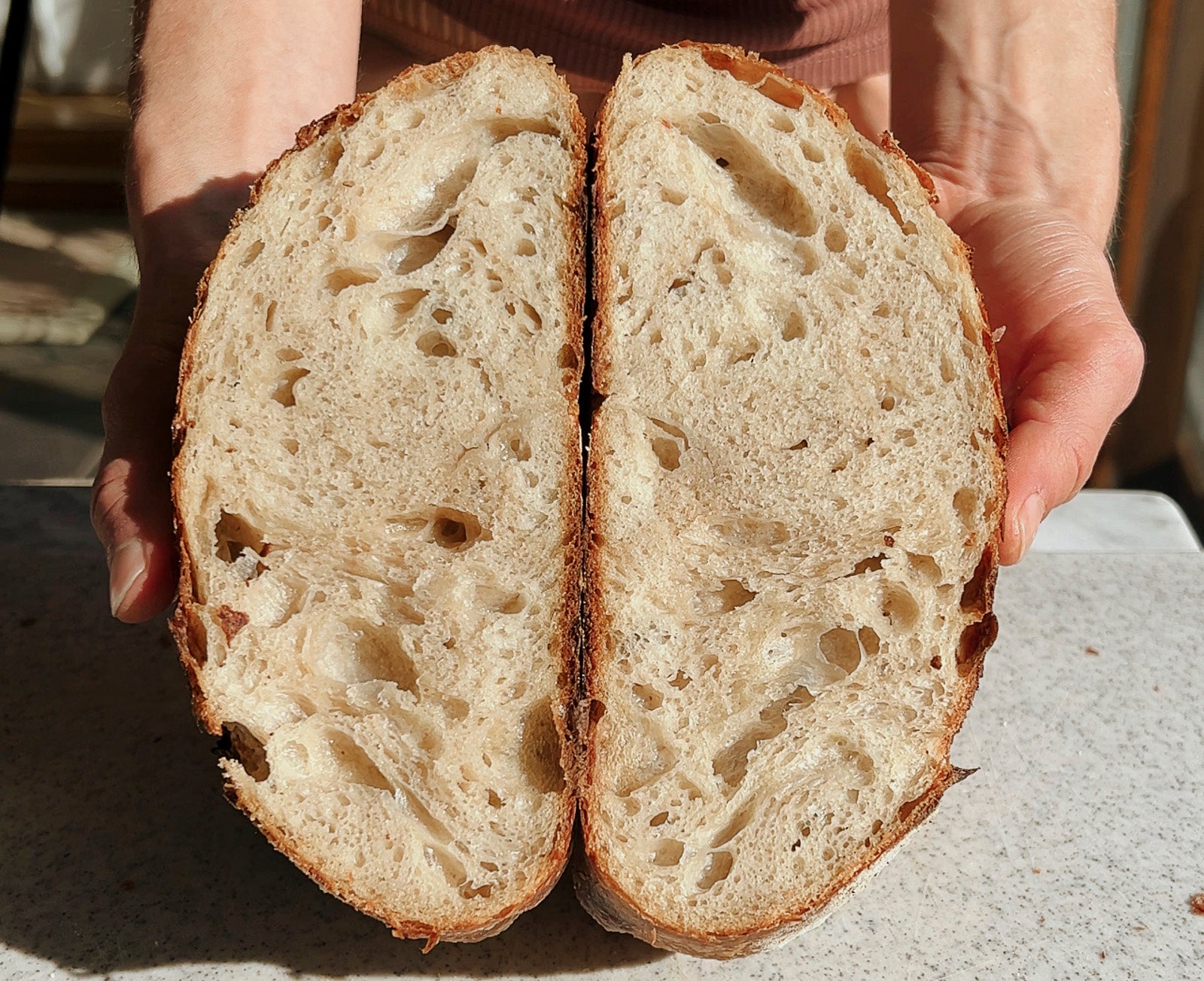Sourdough is the ancient practice of fermenting flour using a bubbly, live probiotic culture – filled with billions of beneficial microorganisms (wild yeasts and lactic acid bacteria) naturally occuring in the environment, organic acids and active enzymes – to transform grains into a delicious, nutrient-rich, and gut-healthy superfood.
WHAT IS SOURDOUGH

WHAT TRANSFORMS GRAINS DURING FERMENTATION?
Wild Yeast

L.A.B.

Organic Acids

Enzymes

THE BENEFITS OF
Sourdough Fermentation
Supports Gut Health

Unlocks Nutrients (Bioavailable)

Degrades Gluten

Boosts Antioxidants

Boosts Prebiotic Fiber

Lowers GI
(Low Glycemic)
Low FODMAP

Creates Delicious Flavor

Supports a healthy gut
Benefit One
Sourdough fermentation improves the digestibility of whole grains by degrading gluten proteins, breaking down non-digestible sugars (FODMAPs), and deactivating anti-nutrients like phytic acid. By pre-digesting compounds that are hard for humans to digest, sourdough fermentation removes potential sources of inflammation and turns wheat and other grains into an easy-to-digest, and highly nutritious food. The beneficial bacteria in sourdough culture also boost antioxidants, organic acids, prebiotic fiber, resistant starch, and branch chain amino acids – all of which help support a healthy and diverse gut microbiome. Thank you very much, billions of infinitesimally small bacteria.

Benefits of a Healthy Gut
A healthy gut microbiome plays a vital role in overall wellbeing:
Improved digestion

mind body spirit

Strong Immune System

LESS BLOATING

reduced inflammation

IMPROVED MENTAL HEALTH

Unlocks nutrients
benefit two
Sourdough fermentation significantly increases the bioavailability of B vitamins and minerals, like iron, zinc, magnesium, and manganese!
Whole grains are chockfull of nutrients, but they also contain phytic acid, a naturally occurring plant defense chemical that binds to vitamins and minerals and actually prevents our bodies from absorbing them. Without fermentation, much of the nutrition in whole grains can not be absorbed. Fortunately, sourdough fermentation removes phytic acid and “unlocks” all of the B vitamins and minerals present in grains.
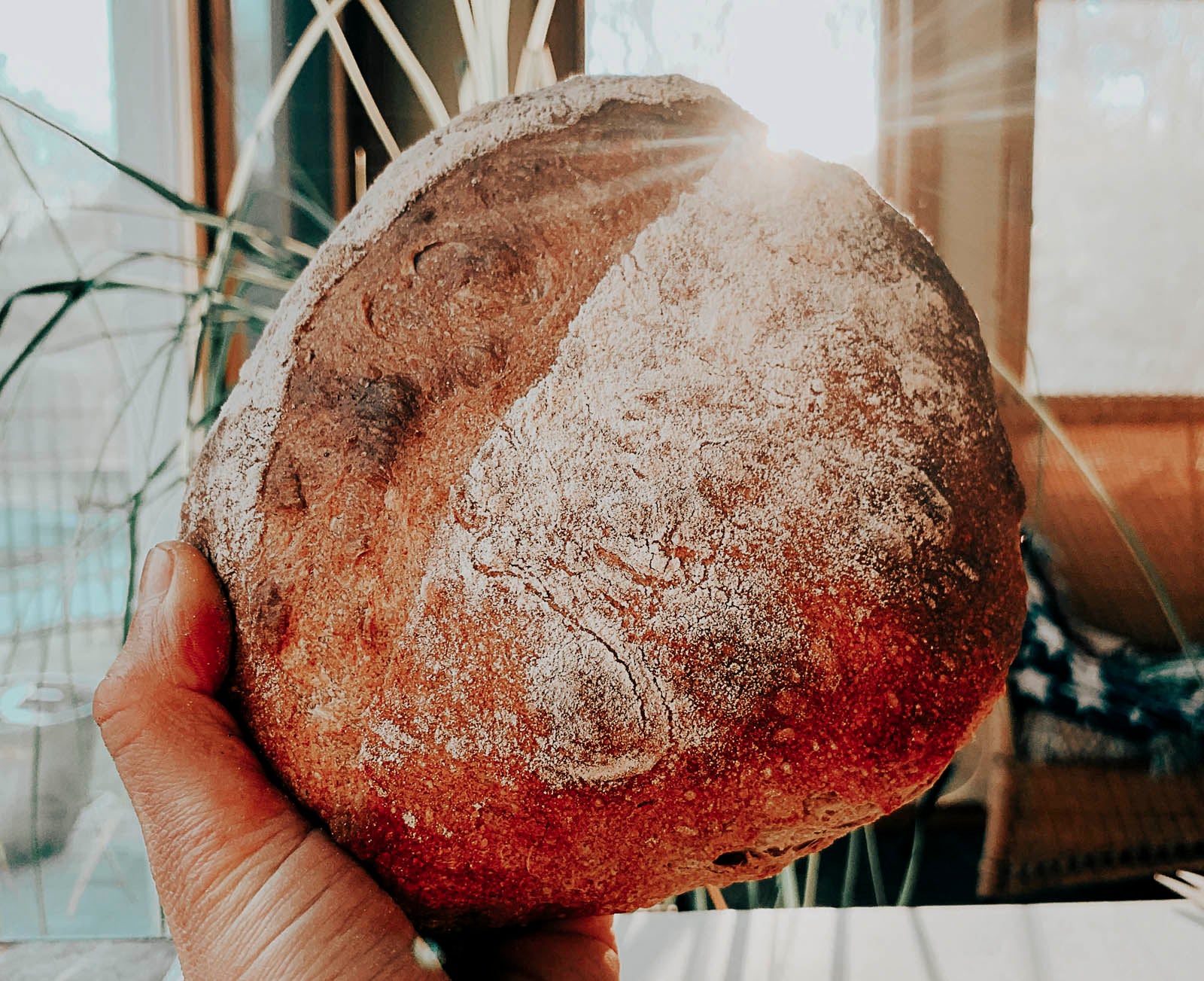
Degrades Gluten
benefit three
Sourdough fermentation breaks down gluten proteins into simple amino acids that our bodies can easily absorb, making sourdough low in gluten and easy to digest. Protein hydrolysis, as it’s referred to, also increases the availability of bioactive peptides - easily absorbed short chain amino acids with beneficial health properties.
While sourdough is not certified gluten free, we know that many people with IBS, gluten intolerance, or gluten sensitivity can enjoy the wonderful health benefits (and flavor!) of sourdough bread.
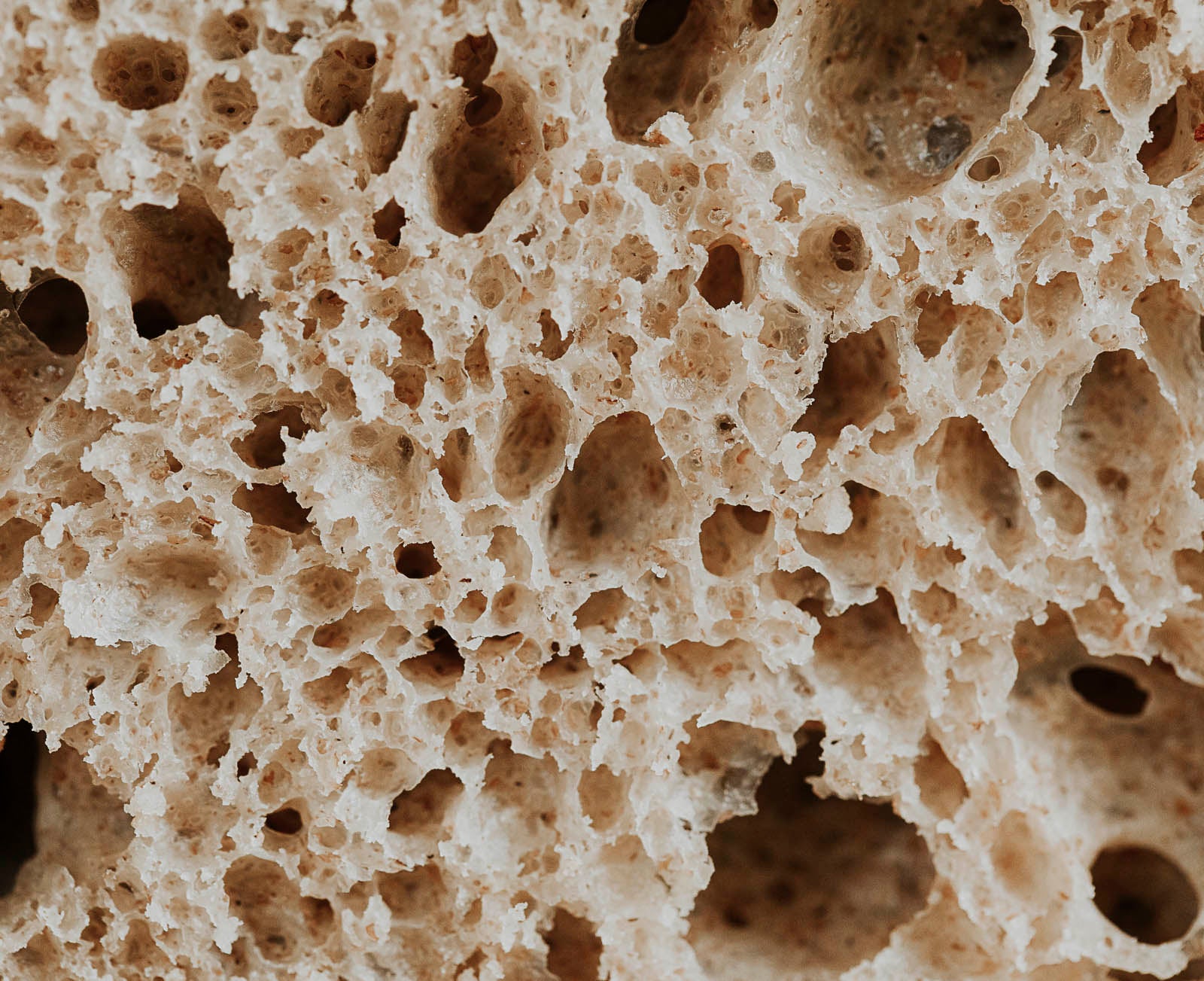
Boosts Antioxidants
benefit four
Sourdough fermentation creates lactic acid, which is a powerful antioxidant with numerous health benefits – AND lactic acid increases the bioavailability of polyphenols, like phenolic acids and flavonoids, which are naturally occurring antioxidants found in whole grains.
An antioxidant that enhances other antioxidants?
Yes please.
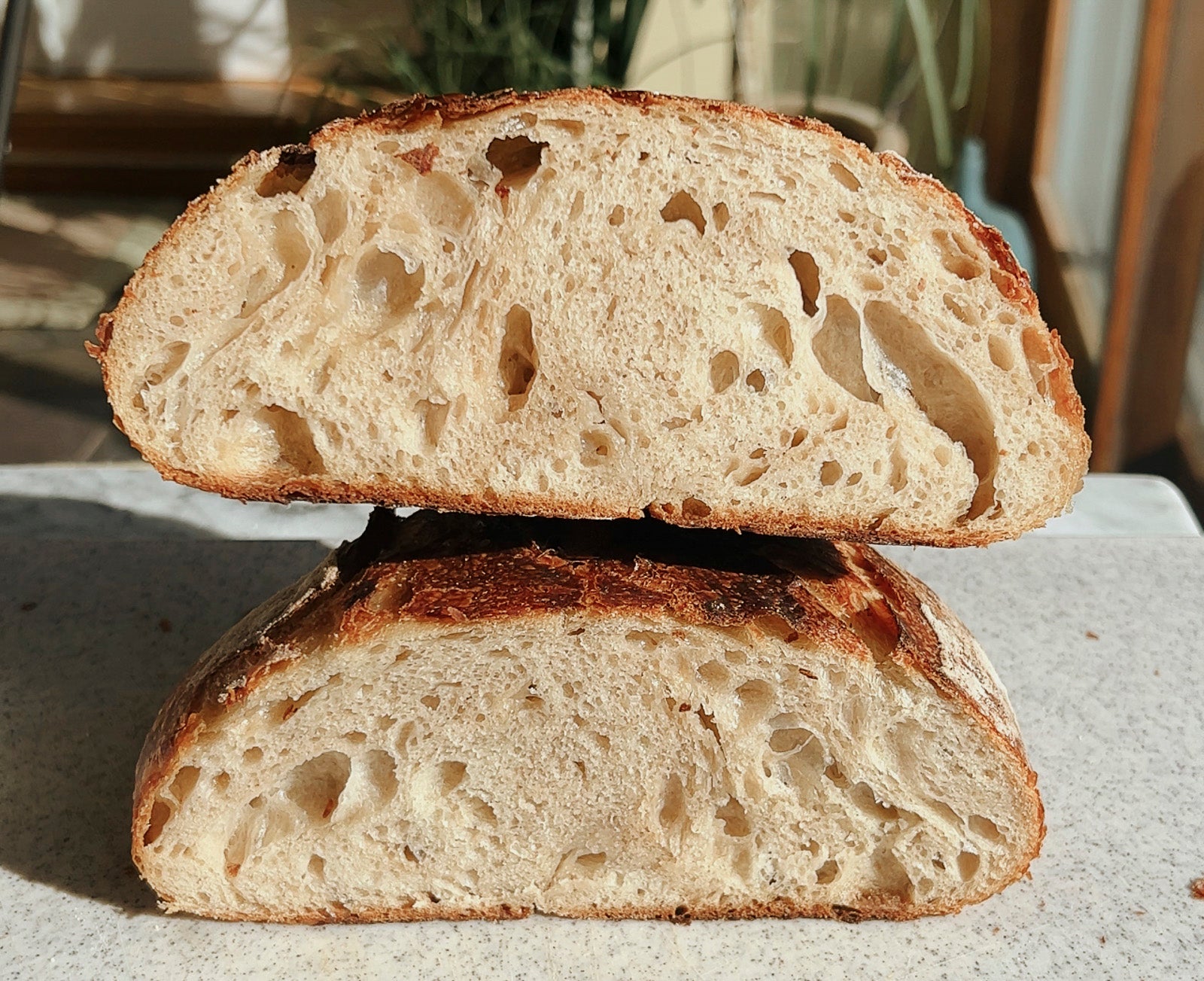
Boosts Prebiotic Fiber
benefit five
Prebiotic fiber is naturally occurring in whole grains, and even more forms during the fermentation process! Prebiotics are a type of indigestible fiber that are an important food source for beneficial gut bacteria and help promote a healthy and diverse microbiome. In particular, lactic acid bacteria produce Beta Glucans, a well-known insoluble fiber with prebiotic properties associated with a myriad of health benefits.
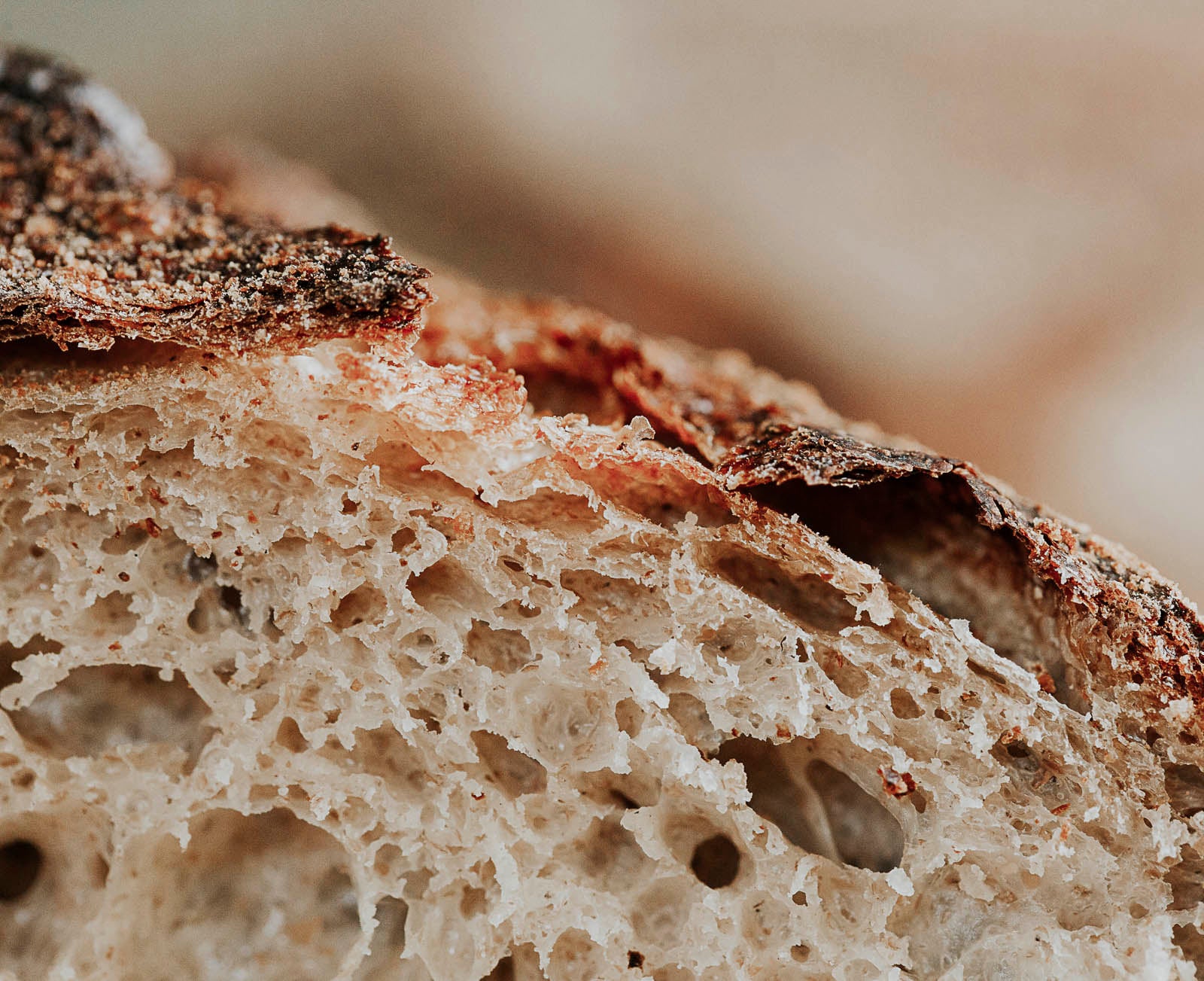
Sourdough FAQs
Yes! Sourdough is low-gluten and can be an amazing option for those with gluten sensitivity or intolerance because the fermentation process breaks down gluten proteins into simple amino acids that our bodies can easily digest. It also removes FODMAPs, which are short chain starches that resist digestion by the enzymes in our gut, and may be a key driver of symptoms for those with gluten sensitivity. Overall sourdough fermentation removes potentially inflammatory compounds in wheat and other grains, making them safe and easy for our bodies to digest.
Sure is. Sourdough fermentation is essentially a long pre-digestion process that breaks down all of the complex and potentially inflammatory compounds in wheat and other grains.
While sourdough fermentation breaks down gluten proteins into simple amino acids that our bodies can easily digest, and significantly lowers the total gluten content, it does not remove gluten completely. Sourdough can be a great option for those with gluten sensitivity or intolerance, but it is not an option for those with Celiac Disease
Sprouting and fermentation are both preparation methods that improve both the nutritional value and digestibility of grains, nuts, and seeds. While sprouting increases the bioavailability of vitamins and minerals, and reduces antinutrients to some degree, it does not offer the same level of nutritional benefit or anti-nutrient reduction that fermentation does. Sourdough fermentation is incredibly effective at breaking down gluten proteins, reducing hard to digest starches (FODMAPs), lowering phytic acid, lowering the glycemic index, and activating B vitamins and minerals, like iron, zinc, and magnesium.
Sourdough isn't a flavor or type of bread; it's a process – a traditional fermentation process. It's the original way of making bread. Sourdough fermentation is the process of fermenting dough with a sourdough starter culture – a diverse community of naturally occurring wild yeasts and lactic acid bacteria. This ancient preparation method produces the very qualities in a loaf of bread that we love so much: the voluminous rise, the chewy texture, the delicious flavor, and the infamous tang. On a microscopic level, fermentation also elicits a whole host of biochemical changes that dramatically alter the nutritional profile and digestibility of grains. At Jesha’s, we employ a traditional 24-72 hour sourdough fermentation to create our baking mixes, so you can enjoy the delicious flavor and outstanding benefits of sourdough in a whole new way!
We mix stone-ground organic whole grains, water, sea salt, and sourdough culture, and allow the dough to ferment for 24-72 hours. After a long and slow fermentation, we slowly air dry the grains and then pair with simple ingredients to create our sourdough baking mixes.
Low Glycemic
benefit six
Sourdough fermentation lowers the glycemic index of whole grains through a few different mechanisms. First, fermentation results in many carbohydrates being predigested by microorganisms before we ever even take a bite, so there’s a lower starch content than before fermentation. Second, the acidity from the lactic acid bacteria also slows down the rate at which our bodies break down carbohydrates. Finally, the fermentation process increases the resistant starch content and prebiotic fiber content, both of which would lead to slower glucose release and a lower glycemic response.

Low-FODMAP
benefit seven
Sourdough is low FODMAP! (FODMAPs are fermentable oligo-, di-, monosaccharides and polyols, aka short chain carbohydrates that resist digestion by the enzymes in our gut.) Unfermented wheat, rye, spelt, and einkorn, and even things like garlic, onions,and cauliflower contain high levels of fructans, a specific type of FODMAP. But, a long and slow fermentation process removes fructans from grains, converting them into a low FODMAP and much more gut-friendly food.

Creates Delicious Flavor
benefit eight
Arguably the most important benefit of all ;) Natural fermentation initiates a series of enzymatic activity and chemical reactions that generate flavor molecules, release amino acids (the ultimate flavor enhancers), and improve the texture, aroma, and nutrition.
